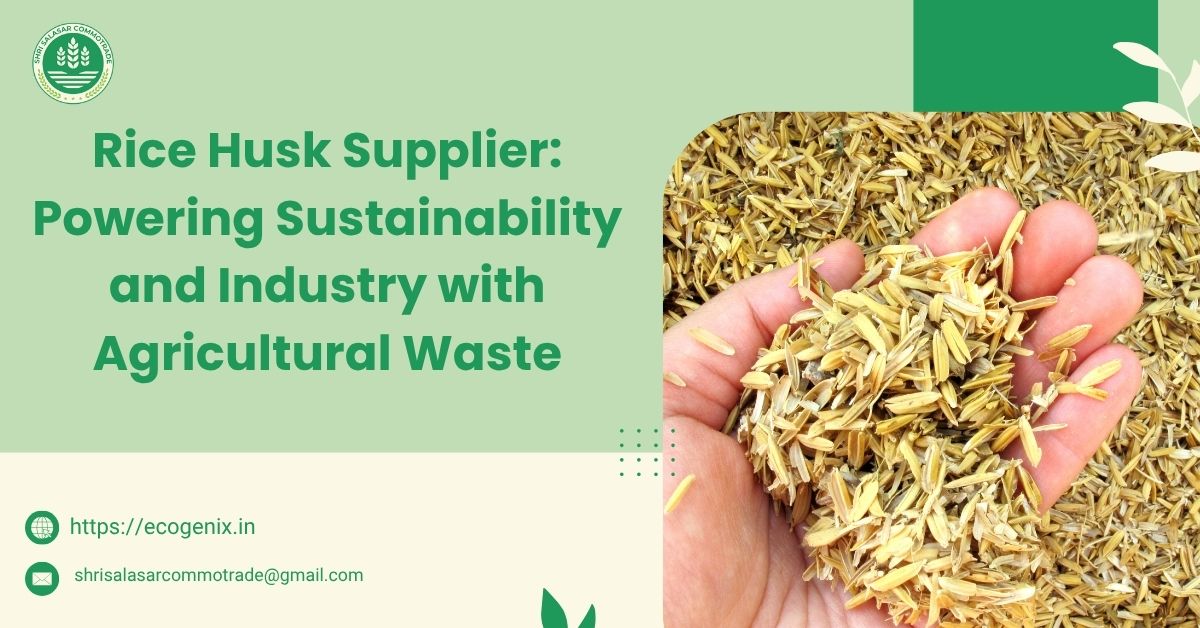Rice is one of the most important food crops in the world, especially in Asia. But after rice is harvest and mill, there’s a byproduct that often goes unnotic: rice husk.While many see it as a waste, some have discover gold in it. This is where rice husk suppliers play a crucial role.
With industries across the globe focusing on sustainability and eco-friendly alternatives, rice husk has become a highly demand raw material for fuel, construction, agriculture, and more. Becoming or partnering with a rice husk supplier is not only a business opportunity, but also a way to contribute to a greener planet.
What is Rice Husk?
Rice husk (also call rice hull) is the outer protective shell of the rice grain. It’s remov during the milling process and usually makes up about 20% of the weight of harvest rice.
For a long time, rice husk was consider waste and either burn or dump. But now, it is value for its:
- High silica content
- Low moisture
- Excellent combustibility
- Lightweight structure
Who is a Rice Husk Supplier?
A rice husk supplier is a business or individual who collects, processes, and supplies rice husk to industries or retailers. They usually partner with rice mills, where husk is generate in large amounts.
Suppliers can be involved in:
- Raw rice husk supply (unprocessed)
- Rice husk ash supply (after combustion)
- Rice husk briquettes or pellets (compress fuel)
- Silica extraction or husk-bas composites
Their customers include companies in:
- Biomass energy
- Construction materials
- Farming and animal bedding
- Steel and cement industries
- Packaging and insulation
How Rice Husk Suppliers Work: The Supply Chain
Collection: Suppliers source rice husk directly from rice mills or rice-processing plants.
Sorting & Cleaning: The husk is cleaned of impurities, stones, or dust if needed.
Processing: It may be converted into powder, pellets, briquettes, or burned to create rice husk ash (RHA).
Packaging: Depending on the industry requirement, it is packed in sacks, jumbo bags, or bulk-loaded for transport.
Distribution: Finally, it is supplied to industries such as biomass plants, brick kilns, or fertilizer companies.
Why Rice Husk is in High Demand: A Sustainable Revolution
In today’s world, sustainability is not just a trend; it’s a necessity. Rice husk is becoming an eco-friendly alternative to many harmful materials. Here’s why:
Renewable Resource: Since rice is harvested every year, husk is readily available, making it a renewable and continuous source.
Reduces Pollution: Instead of being burned openly (which causes smoke and air pollution), rice husk can be recycled and reused for productive purposes.
Biodegradable: Unlike plastic and other synthetic materials, rice husk naturally decomposes without harming the environment.
Low-Cost Fuel: It is much cheaper than coal, firewood, and petroleum fuels, making it attractive for rural and industrial use.
Uses of Rice Husk Across Industries
Rice husk is not just an agricultural leftover; it’s a multi-industry raw material. Here’s how different sectors are using it:
Biomass Energy and Fuel
Rice husk is burne to generate steam and electricity in biomass power plants. It is also press into briquettes and pellets as fuel for boilers.
Construction
- Use as an insulating material in eco-buildings
- Rice husk ash is mix with cement to create stronger, more durable concrete
- Use in fire-resistant panels and eco-bricks
Agriculture
- Works as organic mulch and soil conditioner
- Improves soil aeration and drainage
- Use in organic fertilizers and composts
Animal Husbandry
- Use as animal bedding for poultry and cattle
- Absorbs moisture and provides warmth
Industrial Applications
- Silica extraction from rice husk ash for electronics, ceramics, and paints
- Use in insulation boards, rubber fillers, and fireproofing materials
Why Becoming a Rice Husk Supplier is a Good Business
As global industries seek sustainable raw materials, the demand for rice husk is booming. Here’s why becoming a supplier is a smart move:
High Availability: India is the 2nd largest producer of rice globally. That means an abundant supply of rice husk in every rice-growing region.
Low Input Cost: Raw husk can be source at low cost or even for free from rice mills, especially if mills see it as waste.
Growing Demand: From energy companies to organic farms, more and more sectors are looking for rice husk as an eco-friendly material.
Low-Tech Processing: You don’t need heavy machinery to start. Even basic briquetting or drying can add value.
Profit from By-products: Silica extraction, ash sales, or selling to multiple industries can multiply income sources.
Eco-Friendly Future: Rice Husk in Green Innovation
Rice husk is now being use in biodegradable tableware, eco-furniture, and even bio-composites that replace plastic. Startups across the world are turning rice husk into:
- Disposable plates, cups, and cutlery
- Eco-laptops and phone cases
- Compostable packaging
- 3D printing filaments
This opens new doors for innovative suppliers who want to step beyond raw husk trading.
Note:- Purchase affordable rice husk ash in India
Final Thoughts
What was once a farming byproduct has now become a valuable, eco-friendly industrial material. Rice husk has transform from waste to wealth, and rice husk suppliers are playing a key role in this transition.
Whether you’re looking to enter the biofuel sector, serve green construction, or help farmers go organic, rice husk supply is a business with impact. It’s not just about profits, but also about promoting sustainable growth in a world that desperately needs it.
So if you live in a rice-producing area or want to invest in a green business, becoming a rice husk supplier could be your way forward.



